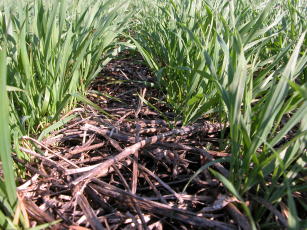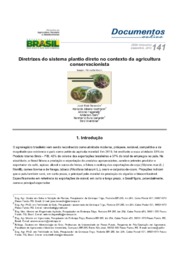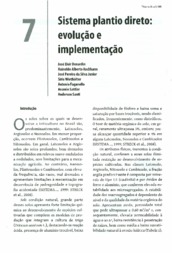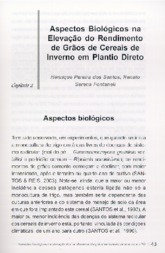Improvement, innovation and development of knowledge and technologies in no-till farming systems for the Brazilian agribusiness - SPDBrasil
Improvement, innovation and development of knowledge and technologies in no-till farming systems for the Brazilian agribusiness - SPDBrasil

Photo: KURTZ, Paulo
From an economic point of view, Brazilian agribusiness has been recognized as modern, prosperous, profitable and competitive activity whose magnitude has established Brazil as a world agricultural power. The activity accounts for 26% of the gross domestic product, 42% of the volume of Brazilian exports, and 37% of the total number of jobs in the country. The finding from this scenario is that development in the country is strongly dependent on an increasing production of agricultural products. That would be premised on conservationism, both in terms of soil maintenance and rehabilitation in agricultural production systems, and within the scope of conserving surrounding natural systems, a fact that establishes new imperatives for the government and for farmers, with the aim of tackling the challenge of stimulating the growth of Brazilian agribusiness with solid conservationist agriculture foundations. In this context, there is a question of whether the current plenteousness attributed to agriculture in the country is really conservationist. Nowadays, a no-till farming system is a soil and crop management technology complex that gathers a broad set of conservationist agriculture precepts, which is available and accessible to farmers and which has potential to confer sustainability to the Brazilian agribusiness. However, out of the 40 million hectares cultivated with annual crops in the country, 26 million hectares are under no-till farming, and it is estimated that the minimum conservationist agriculture precepts required to give robustness to agriculture in the country are only applied in 10 million hectares of the latter area. When one contrasts the conservationist agriculture precepts advocated for no-till farming systems with those that are currently being adopted, there is evidence of problems like degradation of soil fertility and dilapidation of natural resources, which threaten the projections of growth in agriculture in the country and hence require prioritization in research. An accentuated chemical and physical stratification of the soil has been observed at 0-20cm depth of the surface layer, which induces root concentration in the surface layer (0-5 cm) and increases the frequency of productivity loss due to water stresses, even when there are only short periods without rain, and favors erosion when intense rains occur. The magnitude of this problem is extended through the 30 million hectares of annual crops in the country that do not fully adopt conservationist agriculture precepts, which require improvement, innovation and development of technologies on a regional basis . Since it confronts the problems related to the adoption of no-till farming systems as a technology that promotes sustainability in agriculture, with the evolution of scientific and technological knowledge in Brazilian conservationist agriculture, this approach searches for solutions at three levels of action: technological improvement and innovation; validation and development of technologies; and knowledge and technology transfer. Thus, the project is structured in five action plans. Action Plan I addresses the management of the project, to ensure that projected goals are achieved. The others comprise interrelated and complementary activities: Action Plan II - genesis of soil fertility degradation; Action Plan III - mitigation of soil fertility degradation; Action Plan IV - validation of soil fertility degradation mitigation technologies; and Action Plan V - transfer of knowledge and of soil fertility degradation mitigation technologies. To carry out such action plans, an interinstitutional and multidisciplinary arrangement with complementary skills was established, comprising 15 Embrapa units and education, research, technical assistance and agricultural extension institutions, with the aim of solving the problems identified above, and promote the adoption of no-till farming systems in accordance with precepts of conservationist agriculture, in order to maintain and/or recover agricultural soils and grant Brazil the status of world agricultural power.
Ecosystem: Amazonic, Atlantic Forest, Cerrados Region, Pinheirais Region
Status: Completed Start date: Mon Apr 01 00:00:00 GMT-03:00 2013 Conclusion date: Sat Mar 31 00:00:00 GMT-03:00 2018



